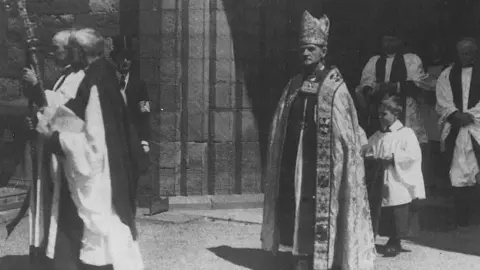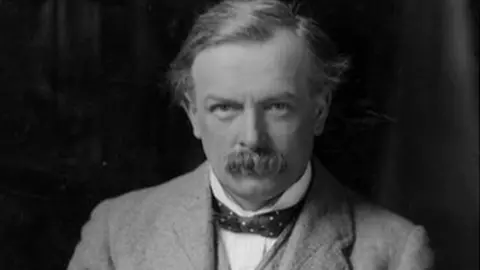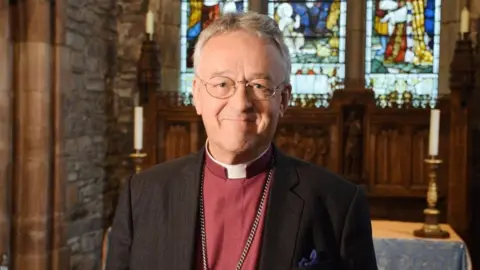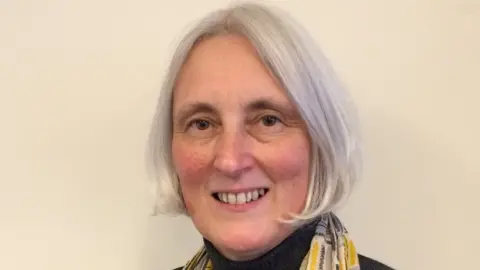Church in Wales prepares to mark centenary
 Church in Wales
Church in WalesThe Church in Wales is beginning celebrations for its 100th anniversary.
But its future was not always certain - establishing it was "extraordinarily controversial", and early members had to steer it away from bankruptcy.
The year 2020 will mark the centenary of the church, and celebrations began on Advent Sunday, the start of the Christian year.
Events are planned across Wales, with the Archbishop of Canterbury due to visit in April.
Christian rap artist Guvna B will also deliver a modern Bible rap across digital platforms.

Growing resentment
Challenges have been there from the very beginning, from the church's foundation in 1920 after breaking with the Church of England.
Resentment in Wales had been growing for decades as people objected to paying tithes - taxes - to support the Church of England, even if they went to chapel instead.
Leading nonconformist politicians, such as David Lloyd George, saw disestablishment as a way to assert national and linguistic identity.
Severing of ties took place in 1914 with the passing of the Welsh Church Act, but was only implemented in 1920 following World War One.
 Getty Images
Getty Images"The creation of the Church in Wales was extraordinarily controversial," said Norman Doe, a professor of law at Cardiff University.
"It was then a new church, with the power to make its own theology and laws."
New elements included bringing in a written constitution, limiting the power of the bishops, and having them elected instead of appointed by the Crown.
According to Prof Doe, it also used lay people in the running of its church courts and made worship more accessible to people.
 Church In Wales
Church In WalesDespite this, throughout its life - and particularly since shops were allowed to open on Sundays in 1994 - the church has faced a decline in numbers.
In 2018, membership totalled roughly 42,000 - or 1.4% of the population of Wales.
Prof Doe said the church must deal with the "ebb and flow" of congregations, but stressed it had had many successes including church schools and the ordination of women priests and bishops.
"Recently, the church has also begun working closely with other denominations, such as Roman Catholics and Methodists, and the world's great religions like Islam and Judaism," he added.
As for the church's place in society, those involved still believe it to be highly relevant.
'People's church'
"When the Church in Wales was newly created, it was effectively bankrupt and ordinary people raised the money to get it going," explained the Reverend Adrian Morgan, 34, priest-in-charge of Gorseinon, Swansea.
"So it was the people's church then, and it still is."
He said much of his own church's efforts are directed towards social outreach.
"At St Catherine's, we bring the elderly and isolated together for food and fellowship," he said.
"We also provide Moses baskets with baby essentials to new mums on a low income and run holiday hunger projects so children get a nutritious lunch in the holidays.
"We know there has been a rise in anxiety, mental health issues and loneliness so we are tackling this."
In addition to recognising the positive influence of the church, leaders say it is equally important to understand and address shortcomings.
"Regrettably, we have not made LGBT+ people welcome in the past, but this has changed and we now welcome all people, whatever their sexual identity," said Anna Morrell, director of communications.
Ms Morrell added it was a "major milestone" that the church had a 50:50 male to female ratio of bishops.
 Church in Wales
Church in WalesIn 2013 the church decided to allow women to become bishops.
The first woman to be appointed one in Wales was the Right Reverend Joanna Penberthy, who became the Bishop of St Davids.
"At the time, having female bishops was a huge change, with many people looking forward to it and others against it," she said.
"Now, though, it seems completely normal and I am heartened by where the church finds itself.
"Change will always be incremental in the church, but society changes so fast nowadays that people have become accustomed to it."